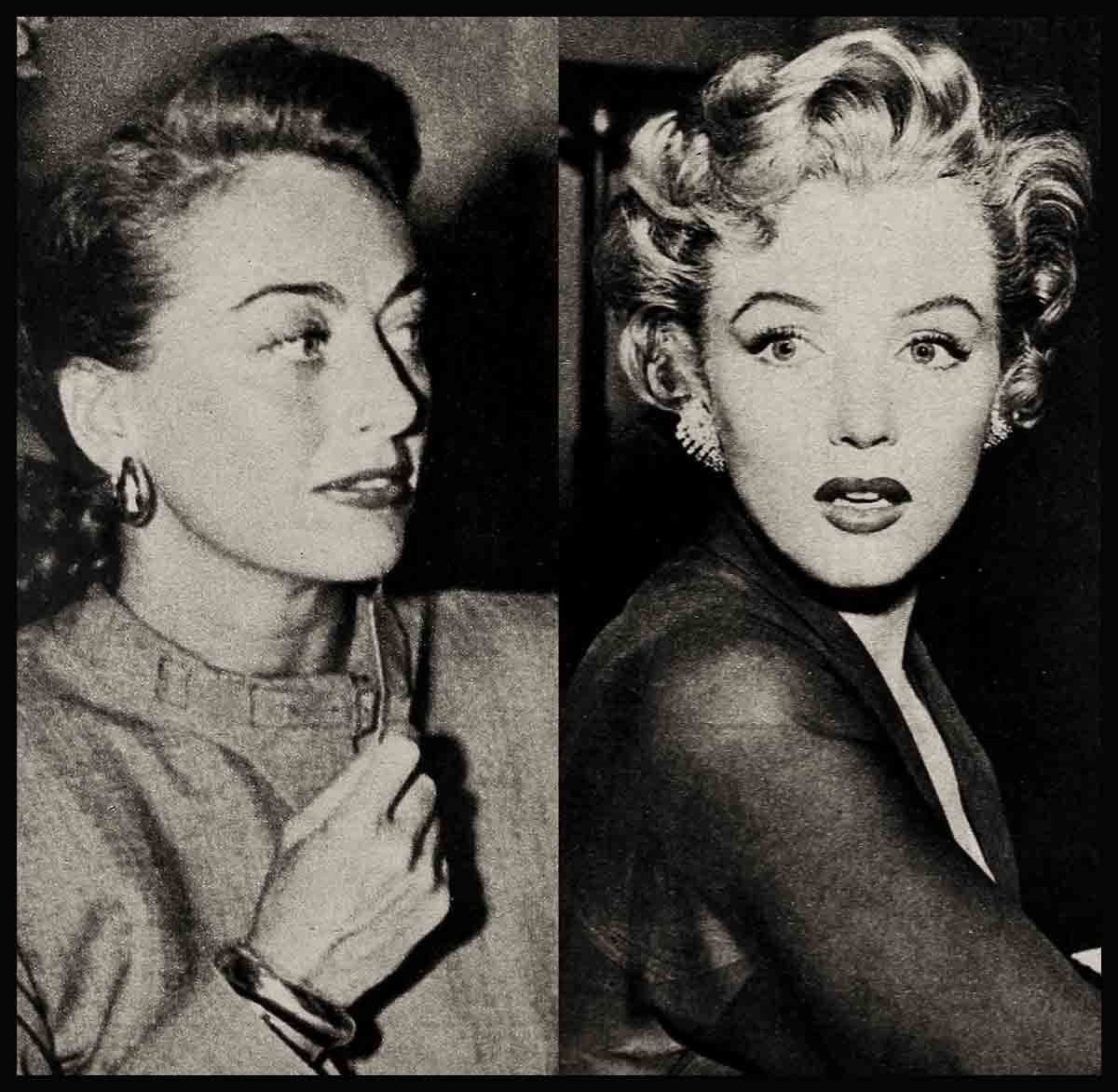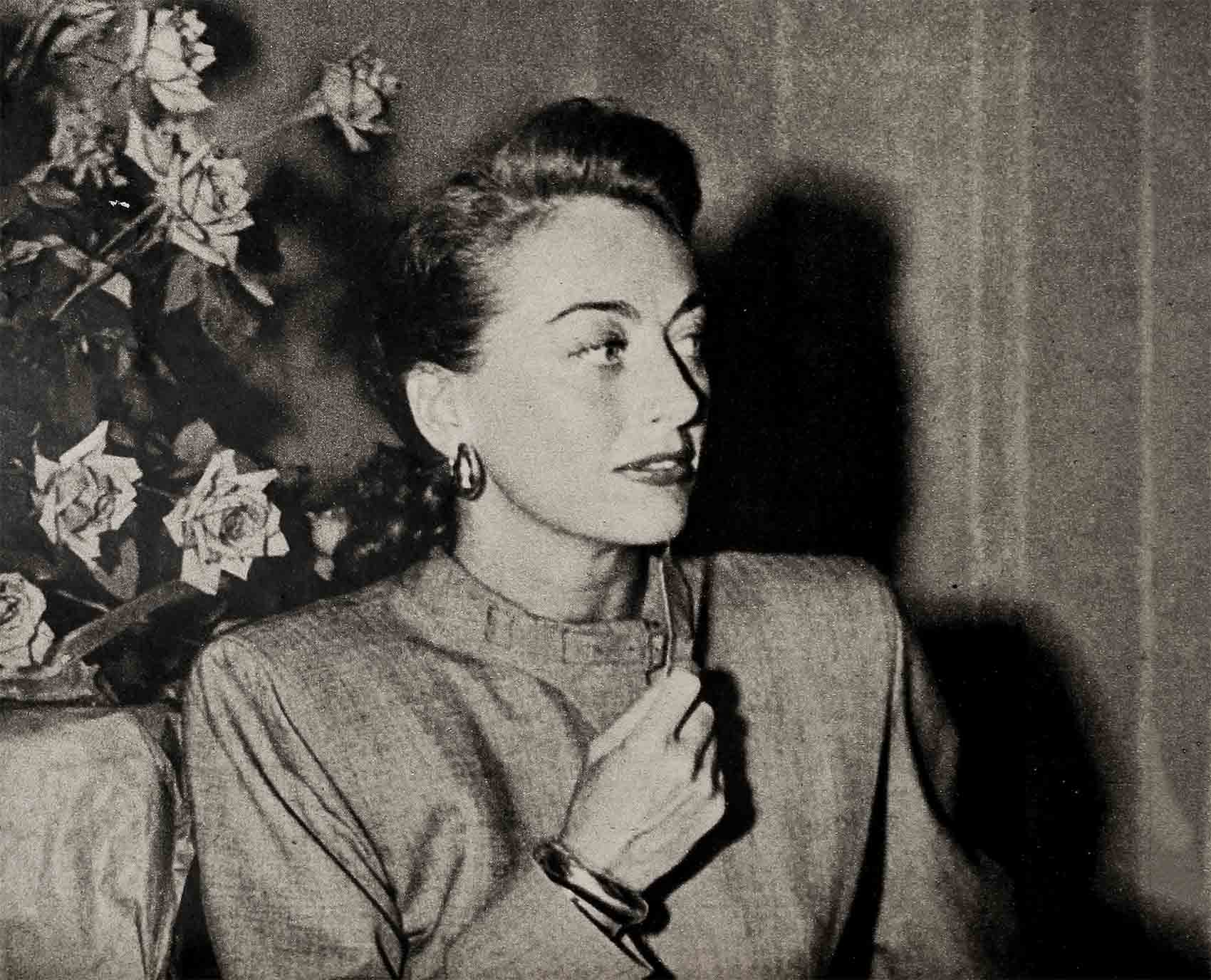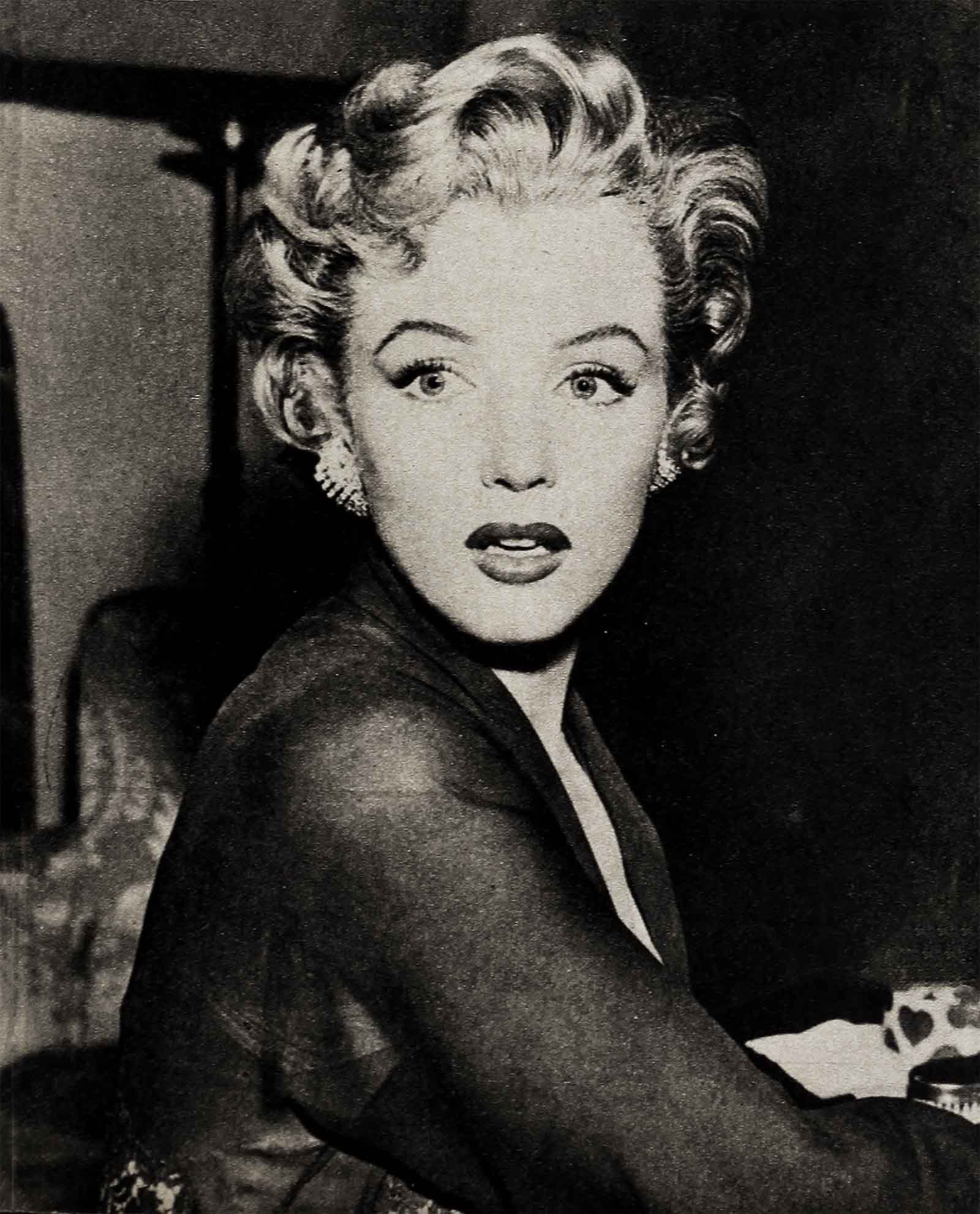
Joan Crawford And Marilyn Monroe Talk To Louella Parsons
Hollywood loves a feud better than a blood brother. It welcomes any sort of a fight—a battle always makes for exciting copy. So, when Joan Crawford blasted Marilyn Monroe in the bitterest interview one glamor girl has ever leveled against another, the town was torn apart.
I waited until the fire was smouldering and practically out before I talked to the stars of the now famous feud, Joan and Marilyn.
“Why did you do it?” I asked Joan, whom I have always known to be warmhearted, kind and never before too violently critical of anyone. “Why did you tear Marilyn apart publicly? If you thought she needed your help, why didn’t you give it to her in private?”
“You’ll be surprised,” Joan said, “but that’s exactly what I wanted to do. I thought, when Bob Thomas came to get an interview with me on the subject of the Academy Awards—which is. what he had asked for—that we were finished after we discussed this topic.
“He was half way out the door and on his way to an appointment at MGM, when suddenly he stopped and said, ‘Don’t you think Marilyn Monroe was too sexy in Niagara—and don’t you think that dress she wore at an awards dinner was disgusting?’
“Because I was sure our conversation was now off the record, I answered his questions. I was shocked when I later read the interview which contained two lines about the Academy Awards and the rest was all a blast at Marilyn.
“I wish I could say I didn’t say those things, but I did say them! I was not misquoted! But, believe me, in the future I will think twice before I talk so openly!”
There was so much honesty in what Joan said and so much distress in her voice that I reached over and patted her hand.

We were sitting in a quiet corner, away from the other guests at a small dinner party at my home. Dinner was over—and I knew Joan wanted to talk to me. And you can bet I wanted to talk to her!
When the others started talking or gathered around the piano to sing, I motioned for Joan to join me away from the group. (I think most of them would have given anything to have heard what we were saying for the Crawford vs. Monroe feud was still the talk of the town.)
Joan and I have been friends for many years now and I feel I understand her very well.
I sincerely believe she would give anything in the world if she had never said those things about Marilyn. But, once the damage was done, you’ve got to admire her spunk for saying she was not misquoted!
She was in the firing lime—but she was standing there taking it—and saying she was sorry! You’ve got to admire a girl like that.
Joan leaned toward me and said softly, “There’s still room in this town for both of us. I feel if I were to meet Marilyn face to face I’d say, ‘Hi, there,’—and we’d shake hands.
“The fight seems to be more with her studio (20th) and the press against me rather than the fans although I have had ta few letters of criticism.
“One was from a sergeant who is great Marilyn Monroe fan. He enclosed an awful picture of me in a bathing suit with my hair all fizzy. The caption was to the effect that I was skyrocketing like the Fourth of July. The sergeant wrote: ‘This is exactly how Miss Monroe dresses today, only you haven’t her good points!’ ”
It was typical of Joan to tell this on herself.
She went on, “I wrote to the sergeant and told him that the blatant picture most certainly was me. But I explained that I had since learned that flaunting your sex in clothes, photographs or in action is not good for an actress.

“Perhaps I subconscious felt I could help Marilyn because I had worked so hard to overcome the many things wrong with me and I am still grateful to more experienced actresses who gave me advice—and criticism—along the way.”
It was almost time for us to rejoin my guests unless I was going to be a rude hostess and I said so to Joan. She nodded. Then, as we rose, she said quickly:
“Louella, just one more thing. I do want Marilyn to know how bitterly sorry I am that this interview was ever printed. But for this thing to go on and on, as though someone had been murdered, is ridiculous.”
We now lap-dissolve (as they say in movie scripts) back to a conversation I had with Marilyn the day after Joan’s blistering interview hit the press.
She had been crying her eyes out all night. Her voice was so choked up she sounded as though she had a terrible cold.
“I don’t believe Miss Crawford said those things about me,” she whispered. “Everybody’s calling, calling, calling, to see what I have to say. What shall I do?”
“Say ‘No comment’ to everything—and then you can’t get in trouble,” I advised my little blonde friend.
But three weeks later, with letters from the fans pouring in, I called Marilyn again and told her I thought the time had come for her to say something.
The intervening weeks had calmed Marilyn down to a noticeable degree. This time she really had a bad cold and she had been out of the hospital just 24 hours when she dropped by my house in the afternoon.
She looked very pretty if still a little ill and her suit was simple and in good taste. I remembered the first time I had met her, just as she was starting her sensational climb, at a party at Joseph Schenck’s home. The dress she wore was cut too low and she looked like a siren—until she opened her mouth.
Then I realized what a shy, ill-at-ease girl she really was, despite all her lush, sexy beauty. Her sudden, dizzying success had given her confidence—but not much.
Marilyn slipped into a chair and tossed her jacket back because the day was warm. After we had chatted a minute about this and that, she got to the point.
“Miss Parsons,” she has never called me Louella—nor does she call many people by their first name, “I don’t want to feud with anyone. All I want is to get to feeling well again and get good pictures at the studio ‘and learn to become a better actress.
“I think the thing that hit me the hardest about Miss Crawford’s story is that it came from her. I’ve always admired her for being such a wonderful mother—for taking four children and giving them a fine home. Who, better than I, knows what it means to homeless little ones.
“Although I don’t know Miss Crawford very well—I met her once at a dinner party, she was a symbol to me of kindness and understanding to those who need help.
“At first, all I could think of was ‘Why Should she select me to blast?’ She’s a great star. I’m just starting. And then, when the first hurt began to die down, I told myself she must have spoken to Mr. Thomas impulsively, without thinking.
“In view of many things that have happened since the article appeared, I’m beginning to look on it as a blessing in disguise. If it had never been printed I might never have realized how many friends I have, even ones I’ve never met.
“Lots of GIs wrote me letters saying, ‘We like you the way you are.’ Miss Parsons, that meant a lot to me. It’s one thing that made me decide to go to Korea if I never do another thing in my life. I couldn’t get over the fact that so many kids, who were having it so bad themselves, didn’t want me to have my feelings hurt.
That’s not all. People in our business were so unexpectedly kind. As you know, I don’t know many stars outside of the few I’ve worked with. Think of it, Betty Grable, the biggest star on the 20th lot asked me to lunch with her and she said:
“ ‘Marilyn, don’t let this get you down. I’ve taken plenty of criticism and so have other actresses. Just keep plugging. The important things are your career—and trying to improve yourself,”
Marilyn enthused, “I love Betty,” (notice she doesn’t call her “Miss” Grable), “she’s such a good person. Maybe this seems silly, but we were doing a scene for How To Marry A Millionaire and Betty noticed I had no polish on my toes as I had worn in a previous day’s work. She ran and got that polish and put it on herself.
“There were no press agents or newspapermen around so she didn’t do it as a grand gesture.
“And Mr. William Powell is another who went out of his way to be kind to me. He said, ‘You remind me of a girl I loved very much. You don’t look like Jean (Harlow)—but you have the same warmth and inner radiance that made Jean such a lovable person.’ I think that is the sweetest compliment I ever had.
“And you have been so good to me, Miss Parsons,” she said, impulsively. “That’s why I feel I can talk with you and tell you the way I feel because I know you will make it sound right even if I don’t always express myself just right.”
I told Marilyn she “expressed” herself all right because she’s always honest and never tries to fool herself—or others.
She knows she first attracted attention because of her sexy appearance—but she’s trying as hard as she can to improve herself as an actress.
For this reason, the part of Joan’s article which hit her the hardest was the reference to her vulgar walk in Niagara.
She said, “You see, the character I played was a tramp. The role called for me to wear very tight dresses and high heels. The combination of a dress I could scarcely move in and the high heels caused me to ‘wobble’ when I walked.
“With all the publicity I’ve had and everything, I suppose it will be hard for many people to believe that I never deliberately throw my sex around, thinking, ‘If I do this, it’s sexy—or if I look a certain way, it’s sexy.’ ”
I know what Marilyn meant. At a party, she’s never thinking of how she can slay all the males present. She never flirts, or tries to attract attention, or makes a “play” for the men.
For a girl so over-abundantly endowed with sex appeal, there have been few men in her life.
She had an unfortunate early marriage; she loved Johnny Hyde (the lovable little agent who helped her career so much) without ever being in love with him. For the past two years there has been no other man in her life but Joe DiMaggio.
Compare Marilyn’s “love life” with the records of some of our glamor queens and it’s modest, indeed.
Sex has been the stepping stone to her career—and she’s not knocking it! But the lowcut dresses and the dreamy-eyed photographs have served their purpose, and she’s eager to go forward as a performer and as a person.
“This is why I’m gradually getting over the hurt of Miss Crawford’s interview,” Marilyn said just before leaving. “It’s over and done with and I shan’t think about it anymore.
“I’ll just keep on believing she didn’t really mean all those things she said to Mr. Thomas.”
And she didn’t, Marilyn. Believe me.
—BY LOUELLA PARSONS
JOAN CRAWFORD GIVES MARILYN MONROE A TIP
BY BOB THOMAS
Joan Crawford today aimed this curt message at Marilyn Monroe: Stop believing your publicity.
The curvaceous blonde has been the subject of a hot controversy during the past fortnight. Women’s clubs have protested about the nature of her publicity and the advertising photos for her pictures.
Adding fuel to the fire were reports that her latest picture, the first with which she could demonstrate her box-office pull, was doing disappointing business. Then there was her much-publicized appearance at an awards dinner.
Miss Monroe showed up in a 2ipperless metallic gown into which she had been sewn. When she stepped up to get her award as the outstanding personality on the screen. she put on a hip-swinging display that brought the house down.
“It was like a burlesque show,” said the horrified Miss Crawford, who was present at the affair. “The audience yelled and shouted, and Jerry Lewis got up on the table and whistled. But those of us in the industry just shuddered.
“Certainly her picture isn’t doing business, and I’ll tell you why. Sex plays a tremendously important part in every person’s life. People are interested in it, intrigued with it. But they don’t like to see it flaunted in their faces.
“Kids don’t like her. Sex plays a growingly important part in their lives, too; and they don’t like to see it exploited.
“And don’t forget the women. They’re the ones who pick out the movie entertainment for the family. They won’t pick anything that won’t be suitable for their husbands and children.”
The durable Miss Crawford. who has lasted longer than any film star in history, said the Monroe buildup was clever and well planned. It was the work of master exploiters, she remarked, but it got out of hand.
“The publicity has gone too far,” she said. “And apparently Miss Monroe is making the mistake of believing her publicity. Someone should make her see the light. She should be told that the public likes provocative feminine personalities; but it also likes to know that underneath it all the actresses are ladies.”
The Crawford comments were read to Miss Monroe and she was asked if she cared to say anything about them. Miss Monroe started to make a statement and then changed her mind and replied: “No comment.”
Discussing other glamor build-ups, she remarked that Jane Russell had managed herself well.
“Howard Hughes tried to make her out a sexy dish at first,” she said, “but Jane managed to keep her feet on the ground.”
Then there was Jean Harlow, who was first painted as a platinum blonde vamp. When that novelty wore off, she became a successful comedienne. Apparently 20th Century-Fox has the Same thing in mind for Monroe.
Miss Crawford, who is up for her second Oscar with Sudden Fear, added: “I think she’d better become a comedienne—or something.”
THE END
It is a quote. MODERN SCREEN MAGAZINE JULY 1953




